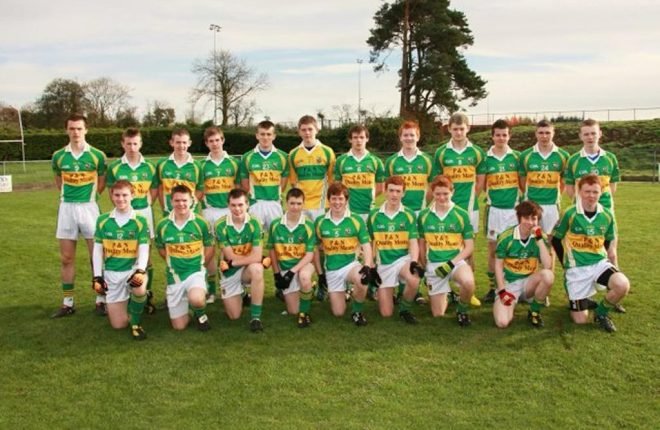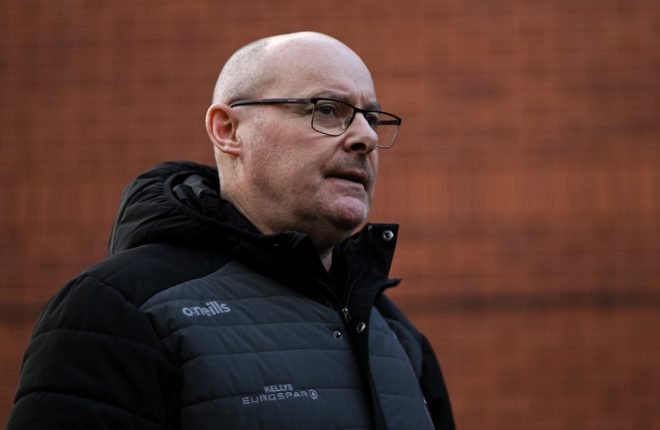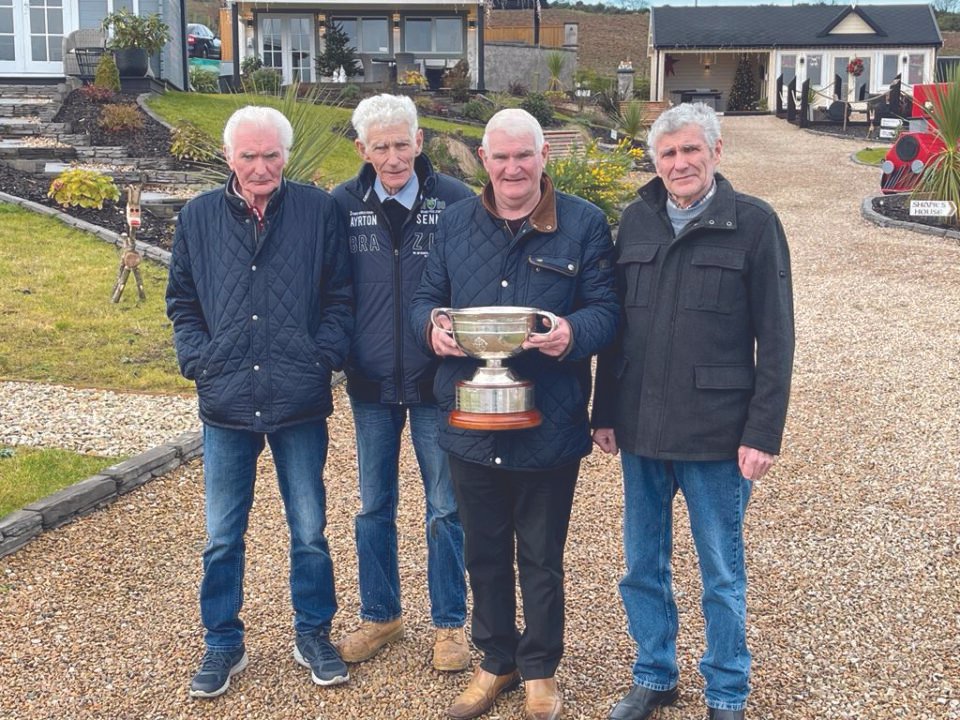Glen’s recent run of success has been years in the making and club stalwart John J McKenna is loving every moment. He sat down with Michael McMullan…
AS Glen’s golden generation amassed their unprecedented array of underage medals, on their way to chasing club football’s glitziest piece of silverware, John J McKenna was always looking over their shoulders.
And he still is. Inside the Glen family and among the Gaels across Derry, he needs no introduction.
When you serve your club in virtually every capacity, and unbroken through the barren years, whether you crave it or not, you are entitled to the level of respect he carries.
He was a Junior Championship winner back in the day as a player. He managed Glen teams. He served as chairman, among over committee roles.
When tickets were being sold, he never shied away. He called the bingo, was a winner in Scór and took part in their version of Strictly Come Dancing when a few bob needed raised.
From the moment the late Jim McGuigan enlisted him, in 1976, to line out McBride’s field on the Five Mile Straight, McKenna was the groundsman. He pruned Glen’s pitches like they were his own before calling it a day in late 2022.
Balancing the role with work, he’d be at Watty Graham Park in the evenings and every Saturday.
“I loved it,” McKenna said. “There was the pride, I used to love people from other clubs coming in and remarking the pitch was in great shape. You might as well have given me a £100.”
If his mind didn’t rest easy, that a job wasn’t done properly, then it wasn’t. It was all or nothing and he was rewarded in 2015 when Ulster GAA deemed Glen to have the tidiest ground in the county.
Being around the pitch so often has helped create a bond with the current players.
“They are so approachable,” he stresses. “They make as much of me as they do of anyone else and I am old enough to be their grandfather…they are really good lads.”
There wasn’t much McKenna didn’t do as one of the Association’s greatest givers of the one thing that is most precious – time.
Is it any wonder seeing the John McLaughlin Cup carried into Glen club in the autumn of 2021 is a moment he places highest of all.
He never thought he’d see the day when Glen were Kings of Derry. Now, the only two teams to have beaten them in three years of championship football, Kilcoo and Kilmacud Crokes, did so on the way to clasping their hands on the lugs of Andy Merrigan.
For any GAA fanatic, this is absolute dreamland. There is no other way of putting it.
John J McKenna is chatting football and thriving after a difficult year. A stroke the week before the Derry semi-final saw him miss the win over Sleacht Néill.
Home from hospital and without full power back on one side, Doctor’s advice insisted he swap Owenbeg for the sofa and the dulcet tones of Alan Gunn as Derry TV beamed the footage to his living room.
It’s the Friday between Christmas and New Year. McKenna is seated in the corner of an empty bar in Glen club. Above his head, is a photo of captain Connor Carville doing what has done all the way through his career – hoisting silverware over his head.
There are winning team photos on every wall. Underage days. Happy faces at homecomings. The green and gold bunting is still there.
John J’s words are softly spoken with a modesty years of watching others take home the big prizes will always ensure. Success comes in cycles. He knows that. Now, it’s Glen’s time. He knows that too.
“To be where we are at the minute is unreal, I still think I am dreaming,” McKenna said.
By his own admission, John J’s playing days weren’t filled with success across

BACK IN THE DAY…John J McKenna, middle back, pictured on a Glen team in 1967
his 18 years.
“We didn’t win much but enjoyed it and made great friends,” he said, pointing to the height of their glory.
“At that time there was only junior and senior, so it was a big thing to win a Junior Championship.”
The homecoming took the Wattys to the National Hall, now an unused building the club’s recent victory cavalcades pass on their way to Peter’s corner before hanging a left and on the social club.
“You went home and were asked how many were at it,” McKenna jokes about the finals of his generation. “There might have been 200 at it, but you said there was a big crowd at it.”
They enjoyed their days no less. But times have changed. The facilities are always developing.
Business is always brisk at the club’s gear shop before every game. Before the All-Ireland final last year, the queue stretched down the corridor, through the front doors on its way to the roadside.
In his playing days, McKenna speaks of the common trend, one ball between everybody. Now, when kitman Declan Dougan is again the first Watty to arrive in Newry on Sunday, he’ll almost have a ball for everybody.
“It is good to see things progressing,” McKenna adds, before again looking back on his own career.
He doesn’t forget those who passed away. Men like Niall Regan, Neecie Kelly, Seamus Lagan, Peter Lagan, Terence Madden and Johnny Kielt.
Of those he played with, McKenna places Francis ‘Bunty’ McKee in the outstanding category. Mickey Moran also gets a mention.
“I played a bit with Enda (Gormley) too,” he said with a laugh. “He’ll maybe not like that and people will be thinking he is older than he actually is.”
McKenna paints the picture of Gormley’s “self-made” career. He’d be down at Glen pitch, on his tod, kicking points. Dedication, it’s the same category he places McKee and Moran in.
The current group are the same. They pour everything into the pursuit of success. A Christmas season that enveloped Paul Gunning’s wedding is curtailed.
It was fitting that Gormley, still living in Belfast, threw his lot when a meeting was called to help their underperforming youth system back on the straight and narrow over a decade ago.
He was one of the many who plonked their shoulder to the wheel. Initial success came at u-12 level, morphing into a Féile title in 2008. Everything snowballed from there.
As the young players were coached the basics of the game and pushed outside their comfort zone, McKenna would be there, with one eye looking after the pitch and the other fixed on the talent coming through the ranks.
The well-documented four Ulster minor successes on the trot – 2011 to 2014 – put them on the map. That’s for sure, but the penny dropped earlier for McKenna.
“To me, the change was the Paul McGirr tournament,” he said of the u-16 competition for county champions hosted by Dromore.
“It was a great tournament and there were some great clubs at it. You were playing the same clubs we’ve been playing in Ulster since.”
The pressure was off. It was a walk into an area with freedom, against teams they’d never laid eyes on before. And the young Wattys flourished.

STEPPING STONE…Winning the Paul McGirr Tournament was a significant step in Glen’s journey
All the pieces came together to form a mosaic of underage dominance that also helped St Patrick’s, Maghera expose them regularly in contests against more of the best Ulster had to offer.
Townie teams are not supposed to hold on to their players. The lure of high stools and bright lights usually wins. This Glen group were different, very different.
Of the starting 15 in their first minor winning season, in 2011, all but three will be seriously pushing for a start or feel they deserve game time this weekend.
“They had a great bond…a lot of them were in the same estate,” McKenna said of how they’ve stuck together. Success helps, but it lies deeper.
Beaver Crescent and Beaver Drive, both overlooking the club’s pitch, were home to eight of the team as they grew up.
“If you go down Hall Street, you nearly have the rest of them,” he adds.
They’ve stayed around. The fact it’s a “very talented” bunch also helps. There was a country feel in a town. Their games in the street and hanging out of each other’s pockets gave them the basis the Glen coaching teams moulded into a winning formula.
“It was like winning the league and going into Europe after it,” McKenna said of their days at the various underage tournaments across Ulster. It concocted a lifetime supply of belief. The Christmases in St Paul’s were worth it. Silverware and the memories left in its wake have dwarfed any turkey dinner put on hold.
“Coming home to the club with the cup, to the crowd, there was so much euphoria,” McKenna said of where the Ulster minor success sat in the club’s overall plans.
As McKenna celebrated with the Watty army, the words Enda Gormley offered are still in his mind. Glen were a year too early, 2011 Ulster success was a bonus year.
Of the big hitters, only Michael Warnock and Emmett Bradley were overage for the following season with Conor Glass moving up from the u-16 ranks. Conor McDevitt and Paul Gunning were now starters.
“Some of the lads were only 15 years of age on it, to win it four times, that was unreal,” McKenna added.
As he boarded the busses, Belfast bound; he never thought Glen would be nipped along the way.
It was a well-drilled team and had a bit of class.
“A lot of credit has to go to the likes of Enda, Fergal P (McCusker), Stephen Murtagh, all the lads who looked after them at that time,” McKenna said. It takes one volunteer to fully appreciate the time offered by others for the greater good.
“They did a lot of work with them. It takes a lot of time and it doesn’t happen overnight, there was a lot of dedication.” McKenna saw it all. He practically lived at the pitch.
Whenever he was mowing, washing or tidying, he’d always have a glance at the players as they grew up. Seeing their progress brought an extra glow and spring in the step.
It was the same with the players themselves, the excitement radiated.
Among the plethora of games, an u-14 replay win over Sleacht Néill always rushes back.
The sides couldn’t be separated at Emmet Park. For the replay, cars were strewn along both sides of the Glenshane Pass. So much so that you’d have mistaken it for Glen hosting a senior championship clash.
“It was packed and Stevie O’Hara scored something like 1-3 for Glen to win by a few points,” McKenna recalls. “Underage football is class stuff if you have good teams.”
For McKenna, the game is in rude health. The Kerry golden era across the 1970s and ‘80s was overrated. From a recent viewing, the ‘catch and kick’ tactic isn’t what many feel it was. Hoofing the ball over the sideline isn’t exactly easy on the eye. With a few tweaks to the short passing, football could be improved even further than McKenna’s “great” ranking of the game.
“The fitness level of players now is unreal and if you are not up to that standard, then you’ll not be playing,” he added.
Yet, for all the Glen progression at underage, there was always the doubt they wouldn’t deliver at senior level. The team of the 1980s had promised but failed. Failing to win the championship when relegated to intermediate in the last decade, that was another dark cloud.
But it was always going to take time to reach the maturing years of their mid-twenties.
Keeping them together was important and helped them all the way to the 2019 decider. The all action semi-final win over Sleacht Néill armed them with the favourites’ tag against Magherafelt.
After a promising start, they struggled to get hands on the ball in the second quarter as Rossa took charge. Glen were left chasing a game they almost caught but didn’t.
“If we had beat Magherafelt, I don’t know if we would’ve have progressed to win an Ulster title, to be honest,” offered McKenna.
Everyone did everything in their power, but it wasn’t enough and they didn’t have the slice of luck at times.
After failing to reach the final 12 months later, Glen were soon armed with two key ingredients – the return of Conor Glass from Oz and Malachy O’Rourke’s appointment as manager.

BOSS…Malachy O’Rourke has led Glen to three Derry and two Ulster titles
“It was big,” McKenna said of O’Rourke coming on board, “but you’ll not train a donkey to win the Derby, you have to have the material there.”
All the pieces were aligned and they’ve dominated the Derry scene since. John McLaughlin has returned to Glen for three years on the trot.
“There were people there you wouldn’t have seen around many club matches,” McKenna said of the 2021 homecoming, a watershed moment in the Glen story.
“There were people there from my age right down to toddlers, it was a fantastic feeling.”
Winning Ulster for the first time was another feather in the cap. Retaining it was another in a three-year spell that has transformed the club.
“It has made a big difference to everybody, everybody wants to help out now,” he adds.
The next few days in Glen will be a cross between excitement and nerves. It’s Kilmacud again.
It was the game that dominated headlines for the wrong reasons. McKenna, like everyone in Glen, admits Crokes were the better team. And craftier.
The Glen players came up the road, devastated but dusted themselves down and fixed their eyes on retaining the Derry title.
Getting the Dublin giants to Newry this weekend will be “a bit of a leveller” in McKenna’s eyes. Glen have a good team and Kilmacud won’t be easy beaten.
“It will take a good team to beat them and, to be honest, I think Glen will win it.
“That’s my opinion, I think they’ll win it,” he offers concisely before caveating it with the risk of being wrong. But you have to back yourself.
From the days of playing finals in front of 200 people and tipping a bucket of lime into a barrel of water to mark out a pitch on a loaned out field, Glen’s All-Ireland bid is miles away.
“It still could be miles away but to win two Ulsters is a big achievement, and three Derry Championships on the trot,” McKenna sums up.
If Glen can overturn the champions on Sunday, keep an eye for a silver-haired, eighty-year-old man, in the midst of the pitch invasion, hugging every Glen player within sight.
That will be John J McKenna, the man who walked Glen’s fallow paths now basking in the glory days.

